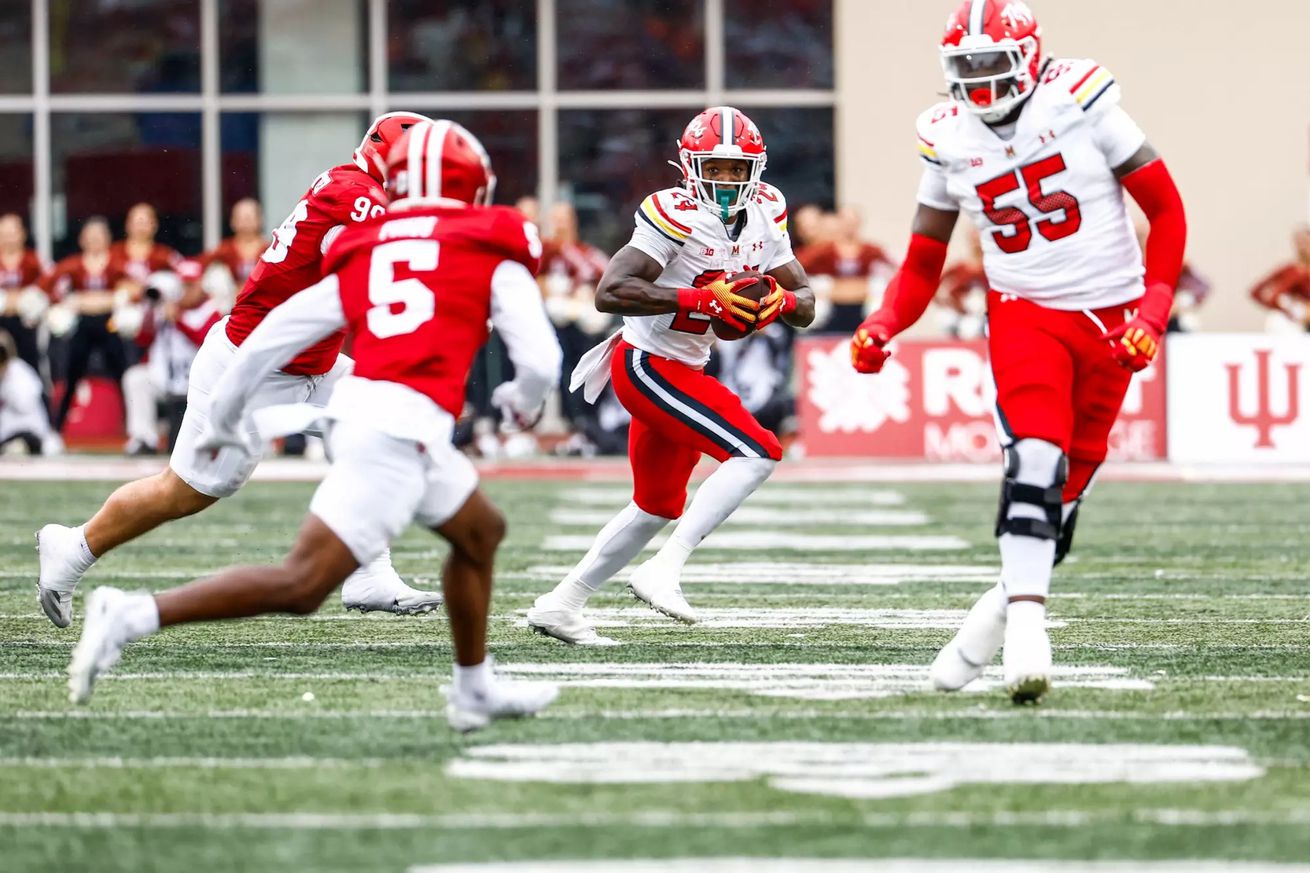
The Terps won the turnover battle, 4-0, but left with a loss.
Maryland football kicked off the core of its Big Ten schedule Saturday at Indiana, but the outcome was not the one it hoped for.
The Terps were plagued by injuries, penalties and inconsistent play. They fell behind by three scores late and ultimately lost, 42-28.
Here are three key takeaways from the game.
Indiana’s four turnovers didn’t slow its production
Heading into the game, Indiana had been flawless in ball security, not committing a single turnover in its previous four contests. But on Saturday, the Hoosiers gave the ball away four times.
Quarterback Kurtis Rourke struggled early, throwing two costly interceptions on Indiana’s first two drives. The first came on an overthrow that cornerback Jalen Huskey snagged, while the second was an underthrown pass across the middle picked off by defensive back Glen Miller.
Indiana also lost two fumbles as well, which could have derailed its chances of winning. But it didn’t.
Maryland failed to capitalize on any of the turnovers and repeatedly had to punt. Quarterback Billy Edwards Jr. was sacked five times, largely due to Indiana’s tight coverage downfield.
Rourke and the Hoosiers’ offense found their rhythm in the second half, especially in the fourth quarter. By then, Maryland was missing key defensive players, including Dante Trader Jr. and Brandon Jacob, due to injuries. Indiana took full advantage, stretching the lead to three scores and finishing with 42 points.
Despite the rough start, Rourke rebounded, completing 22-of-33 passes for 359 yards and three touchdowns.
A few different faces stepped in for the Terps’ offense
Star wide receiver Tai Felton suffered an injury early in the third quarter, a blow for the Terps as the Big Ten’s leading receiver didn’t return for the rest of the game. Felton was held to a season-low 38 yards on five catches.
Later in the game, fellow wide receiver Kaden Prather was also sidelined after an injury, forcing him to exit as well.
With both top receivers out, Maryland’s offense struggled, but it opened opportunities for other players to step up. Running back Roman Hemby took center stage, shouldering a significant load. He tallied 10 carries for 117 yards, including a 75-yard touchdown run. Hemby was also impactful in the passing game, catching five passes for 48 yards and another touchdown. It was Hemby’s best performance of 2024, evoking memories of his dominant 2022 campaign.
Before his injury, Prather hauled in five catches for 66 yards, highlighted by a 33-yard touchdown in the corner of the end zone. He nearly added another score on a deep pass, but the catch was ruled out-of-bounds. Prather was injured on that play.
Maryland then relied on its bench. Shaleak Knotts, Braeden Wisloski and Ezekiel Avit saw increased roles, delivering mixed results. Wisloski was productive, catching three passes for 59 yards, including multiple first-down conversions. Knotts and Avit combined for four catches and 54 yards, but Avit’s target on a critical fourth-down play fell incomplete, sealing the Terps’ fate.
“[Wisloski] came in and made some plays. I need him to be more confident,” head coach Michael Locksley said. “He’s a good player. He’s one of those players that I think he’s better than what he thinks he is at times.”
Costly penalties loomed large for Maryland
Last week, despite beatig Villanova, Maryland committed eight penalties. The trend worsened this week, with the Terps accumulating 10 penalties — nine of them on the offense.
Three of these infractions were easily preventable: an unsportsmanlike conduct penalty on offensive guard Aliou Bah and two face mask penalties, one on each side of the ball.
While the other penalties could be chalked up to miscommunication or poor timing, they point to a larger issue for Maryland. Locksley has repeatedly stressed the need for discipline, and with the tough Big Ten competition ahead, Maryland can’t afford to keep making these mistakes.
“I promise you that I will figure this penalty thing out. We’ll get it fixed,” Locksley said.
On several occasions Saturday, penalties stalled the Terps’ offensive momentum. Just as they began to make progress, a flag would set them back. At one point, Edwards and the offense found themselves in a first-and-30.
Offensive penalties disrupted Maryland’s balance, forcing it to abandon the run and rely on the passing game, which limited their offensive versatility.